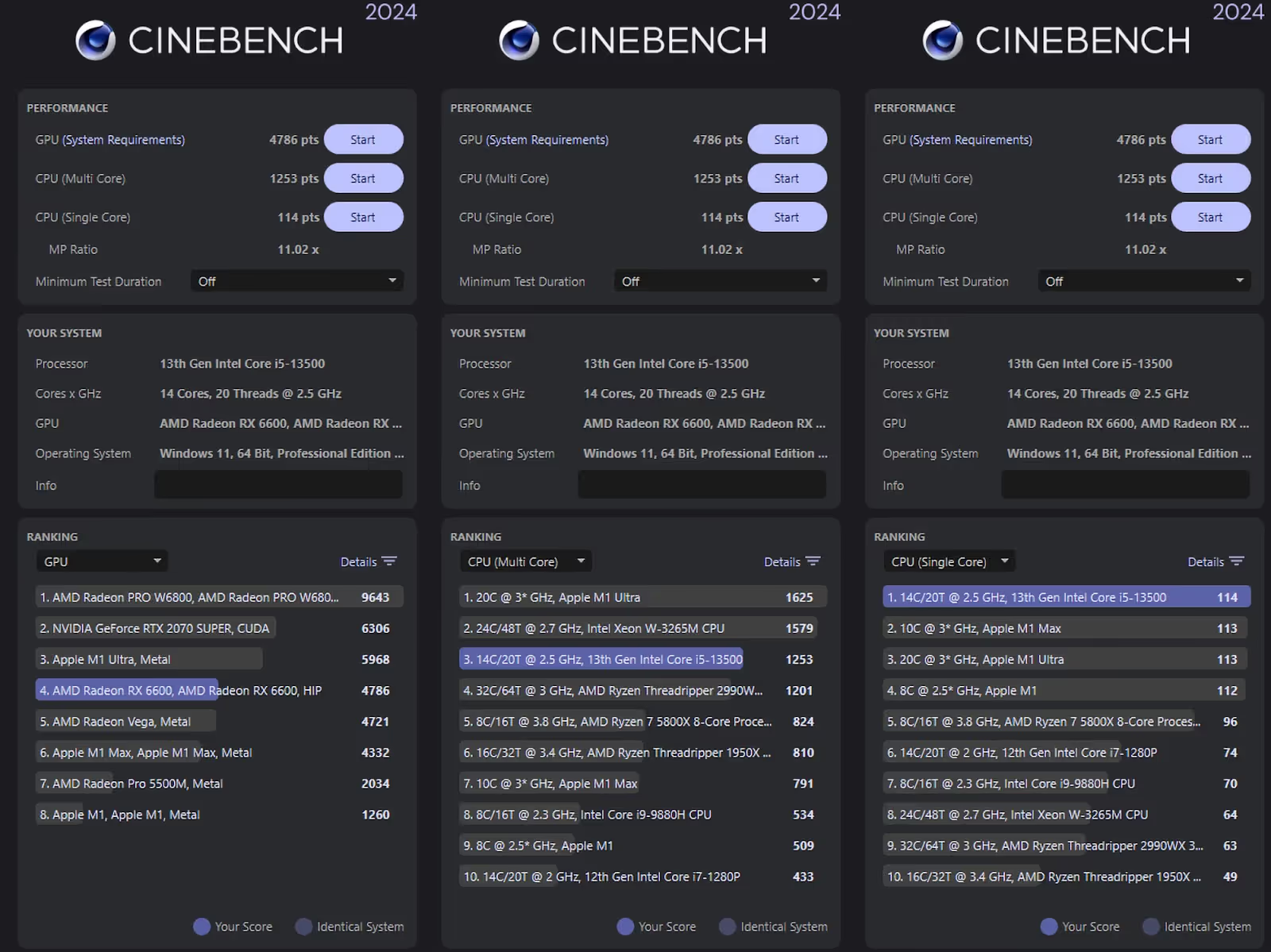.avif)
Cinebench is a robust benchmarking tool developed by Maxon, the creators of Cinema 4D. This software is designed to evaluate the CPU and GPU performance of a computer by rendering highly-detailed 3D scenes. Leveraging the powerful capabilities of the Redshift rendering engine, Cinebench provides users a clear metric of how their hardware performs under intense processing loads—an essential insight for those using a Cinema 4D render farm or tackling large-scale rendering projects.
The latest iteration, Cinebench 2024, supports a wide array of hardware configurations, including traditional x86/64 CPUs from Intel and AMD, as well as modern ARM-based processors like Apple's M1, M2, and M3 chips. This compatibility ensures that Cinebench remains relevant in today's rapidly evolving tech landscape, providing precise performance data for both Windows and macOS platforms.
Originally derived from Cinema 4D's native rendering engine, Cinebench has evolved significantly over the years, adapting to the changes in computing technology and increasing the complexity of its testing environments to better mirror real-world usage.

Cinebench excels in CPU performance testing by simulating real-world 3D tasks that require significant computational power. The software assesses both single-core and multi-core performance, providing a comprehensive view of a processor's efficiency and speed.
For GPUs, Cinebench utilizes Redshift to test the rendering capability of the graphics card using advanced algorithms that push the GPU to its limits. This is crucial for users who rely on their setups for high-end graphics work, including 3D animation and visual effects.
By simulating challenging rendering tasks, Cinebench offers a glimpse into how a system will perform under real-life pressures, such as in VFX production or during complex scientific visualizations.
Cinebench boasts a user-friendly interface that makes it accessible even to novices who might not be familiar with detailed benchmarking processes. It guides users through the benchmarking process with ease, ensuring that they can measure their system's performance without prior technical knowledge.
Cinebench conducts tests by rendering a predefined scene using the system's CPU and GPU. This process assesses the hardware's ability to handle complex and memory-intensive tasks. The results are then scored to provide a quantifiable measure of performance.
Scores produced by Cinebench are tailored to the latest hardware standards, meaning they cannot be directly compared to results from earlier versions due to differences in testing parameters and scene complexity.
While similar tools like Geekbench and 3DMark also measure system performance, Cinebench is uniquely focused on scenarios that mimic high-end 3D content creation, providing insights that are particularly relevant to graphics professionals and enthusiasts.
Cinebench is widely used in the industry to evaluate and compare the performance of CPUs and GPUs across different systems and platforms. This is vital for manufacturers and developers who aim to optimize their products for better performance.
Hardware manufacturers use Cinebench scores to refine and enhance their products. The feedback gathered from Cinebench testing helps in making informed decisions regarding hardware developments and updates.
For gamers and professionals in the graphics field, Cinebench provides an indicator of how well a system can handle gaming environments and graphic design tasks, respectively.
Downloading and installing Cinebench is straightforward. It is available for free on Maxon's website and supports both Windows and macOS. Users can start benchmarking their systems immediately after installation.
Users might encounter issues related to system compatibility or configuration settings, which can affect the accuracy of the benchmark results. Ensuring that the system meets the software’s requirements and checking for the latest updates are crucial steps in troubleshooting.
To get the most reliable results from Cinebench, it is recommended to close all other applications and disable any background services that might interfere with the benchmarking process.
For those looking to dive deeper into the specifics of Cinebench or seeking additional support, Maxon offers a range of resources including detailed guides, a supportive community forum, and tutorials through Cineversity—a dedicated platform for learning all aspects of Cinema 4D, which underpins the technology used in Cinebench.
Cinebench stands out as a critical tool for anyone involved in computer hardware, from casual users curious about their system's capability to professionals optimizing workstations for intensive 3D tasks. Its ability to simulate real-world applications and provide detailed, comparable results makes it an invaluable resource for making informed decisions about hardware purchases and upgrades.
The continuous development and refinement of Cinebench, evidenced by the recent releases and updates, reflect Maxon's commitment to keeping pace with the advancements in computing technology. Whether you're testing the latest high-end GPUs or comparing CPU performances across different platforms, Cinebench provides a clear and accurate measure of what your hardware can achieve, thus ensuring that your system is ready to handle the demands of today's digital content creation challenges.
For more detailed information and to download Cinebench, visit Maxon's official website
.